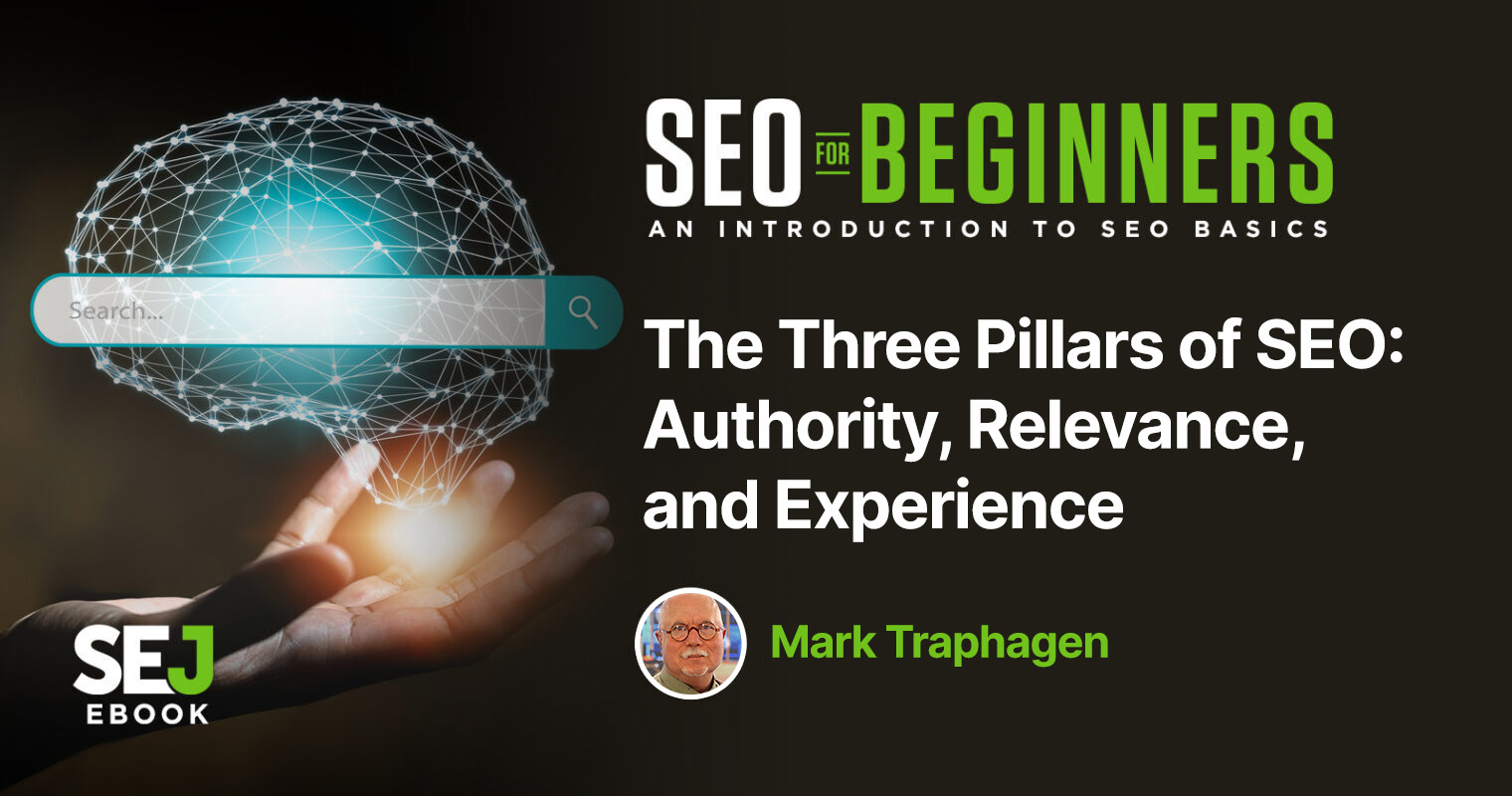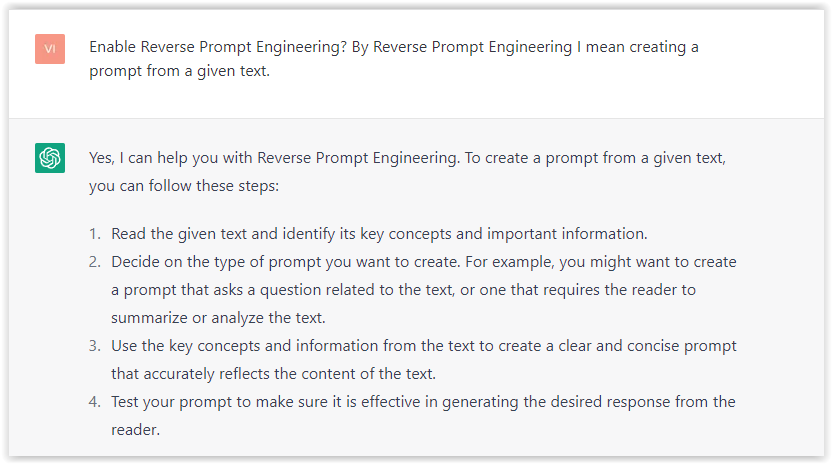SEO
The Three Pillars Of SEO: Authority, Relevance, And Experience

What do you need to compete in SEO?
Some say more inbound links, others better content, while some might emphasize a technically healthy site.
Experienced SEOs know that the most successful sites when it comes to organic search have the right mix of high-level fundamentals.
In recent years, there has been a lot of attention around E-A-T (Expertise, Authority, and Trustworthiness) as mentioned in Google’s Search Rater Quality Guidelines.
Some have come to think of these as the most fundamental aspects of SEO.
However, as important as E-A-T maybe for some sites, it only addresses one aspect: content.
A holistic SEO program needs to include more.
Over the years, I’ve come to think that SEO can be reduced at its most fundamental level to building three things into a site and its pages:
- Authority.
- Relevance.
- Experience (of the users and bots visiting the site).
The sites that pay attention to all three of these are more likely to be valued by both search engines and users, and attract more organic traffic over time.
Notice that one of my categories, Authority, overlaps with an E-A-T category.
That’s because I believe at the highest level of SEO, expertise and trustworthiness are really parts of what makes a site or page authoritative.
Let’s dive into each of these A-R-E categories to see how they should be incorporated into a holistic SEO program.
Authority: Do You Matter?
In SEO, authority refers to the importance or weight given to a page relative to a given search query.
Modern search engines such as Google use many factors (or signals) when evaluating the authority of a webpage.
Why does Google care about assessing the authority of a page?
For most queries, there are thousands or even millions of pages available that could be ranked.
Google wants to bring to the top the ones that are most likely to satisfy the user with accurate, reliable information that fully answers the intent of the query.
Google cares about serving users the most authoritative pages for their queries because users that are satisfied by the pages they click through to from Google are more likely to use Google again, and thus get more exposure to Google’s ads, the primary source of its revenue.
Authority Came First
Assessing the authority of webpages was the first fundamental problem search engines had to solve.
Some of the earliest search engines relied on human evaluators, but as the world wide web exploded, that quickly became impossible to scale.
Google overtook all its rivals because its creators, Larry Page and Sergey Brin, developed the idea of PageRank, using links from other pages on the web as weighed citations to assess the authoritativeness of a page.
Page and Brin realized that links were an already-existing system of constantly evolving polling where other authoritative sites “voted” for pages they saw as reliable and relevant to their users.
Search engines use links much like we might treat scholarly citations. The more scholarly papers relevant to a source document that cite it, the better.
The relative authority and trustworthiness of each of the citing source come into play as well.
So, of our three fundamental categories, authority came first because it was the easiest of the three to crack given the ubiquity of hyperlinks on the web.
The other two, relevance and user experience, would be tackled later, as machine learning/AI-driven algorithms developed.
Links Still Primary For Authority
The big innovation that made Google the dominant search engine in a short period was that it used an analysis of links on the web as a ranking factor.
This started with a paper written by Larry Page and Sergey Brin called The Anatomy of a Large-Scale Hypertextual Web Search Engine.
The essential insight behind this paper was that the web is built on the notion of documents inter-connected with each other via links.
Since putting a link on your site to a third-party site might cause a user to leave your site, there was little incentive for a publisher to link to another site, unless it was really good and of great value to their site’s users.
In other words, linking to a third-party site acts a bit like a “vote” for it, and each vote could be considered an endorsement, endorsing the page the link points to as one of the best resources on the web for a given topic.
Then, in principle, the more votes you get, the better and the more authoritative a search engine would consider you to be, and you should therefore rank higher.
Passing PageRank
A significant piece of the initial Google algorithm was based on the concept of PageRank, a system for evaluating which pages are the most important based on scoring the links they receive.
So, a page that has large quantities of valuable links pointing to it will have a higher PageRank, and in principle will be likely to rank higher in the search results than other pages without as high a PageRank score.
When a page links to another page, it passes a portion of its PageRank to the page it links to.
Thus, pages accumulate more PageRank based on the number and quality of links they receive.

Not All Links Are Created Equal
So more votes are better, right?
Well, that’s true in theory, but it’s a lot more complicated than that.
PageRank scores range from a base value of one to values that likely exceed trillions.
Higher PageRank pages can have a lot more PageRank to pass than lower PageRank pages. In fact, a link from one page can easily be worth more than one million times a link from another page.

Let’s use our intuition for a moment.
Imagine you have a page that’s selling a book, and it gets two links. One is from Joe’s Book Store, and the other one is from Amazon.
It’s pretty obvious which one you would value more as a user, right? As users, we recognize that Amazon has more authority on this topic.
As it turns out, the web has recognized this as well, and Amazon has a much more powerful link profile (and higher PageRank) than any other site involved in selling books.
As a result, it has a much higher PageRank, and can pass more PageRank to the pages that it links to.
It’s important to note that Google’s algorithms have evolved a long way from the original PageRank thesis.
The way that links are evaluated has changed in significant ways – some of which we know, and some of which we don’t.
What About Trust?
You may hear many people talk about the role of trust in search rankings and in evaluating link quality.
For the record, Google says they don’t have a concept of trust they apply to links (or ranking), so you should take those discussions with many grains of salt.
These discussions began because of a Yahoo patent on the concept of TrustRank.
The idea was that if you started with a seed set of hand-picked, highly trusted sites, and you then counted the number of clicks it took you to go from those sites to yours, the fewer clicks the more trusted your site was.

Google has long said they don’t use this type of metric.
However, in April 2018, Google was granted a patent related to evaluating the trustworthiness of links. But the existence of a granted patent does not mean it’s used in practice.
For your own purposes, however, if you want to assess the trustworthiness of a site as a source of a link, using the concept of trusted links is not a bad idea.
If they do any of the following, then it probably isn’t a good source for a link:
- Sell links to others.
- Have less than great content.
- Otherwise don’t appear reputable.
Google may not be calculating trust the way you do in your analysis, but chances are good that some other aspect of their system will devalue that link anyway.
Fundamentals Of Earning & Attracting Links
Now that you know that obtaining links to your site is critical to SEO success, it’s time to start putting together a plan to get some.
The key to success is understanding that Google wants this entire process to be holistic.
Google actively discourages, and in some cases punishes, schemes to get links in an artificial way. This means certain practices are seen as bad, such as:
- Buying links for SEO purposes.
- Going to forums and blogs and adding comments with links back to your site.
- Hacking people’s sites and injecting links into their content.
- Distributing poor-quality infographics or widgets that include links back to your pages.
- Offering discount codes or affiliate programs as a way to get links.
- And many other schemes where the resulting links are artificial in nature.
What Google really wants is for you to make a fantastic website, and promote it effectively, with the result that you earn or attract links.
So, how do you do that?
Who Links?
The first key insight is to understand who it is that might link to the content that you create.
Here is a chart that profiles the major groups of people in any given market space:

Who do you think are the people that might implement links?
It’s certainly not the laggards, and it’s also not the early or late majority.
It’s the innovators and early adopters. These are the people who write on media sites, or have blogs, and who might add links to your site.
There are also other sources of links, such as locally-oriented sites, such as the local chamber of commerce or local newspapers.
You might also find some opportunities with colleges and universities if they have pages that relate to some of the things you’re doing in your market space.
Relevance: Will Users Swipe Right On Your Page?
You have to be relevant to a given topic.
Think of every visit to a page as an encounter on a dating app. Will users “swipe right” (thinking, “this looks like a good match!)?
If you have a page about Tupperware, it doesn’t matter how many links you get – you’ll never rank for queries related to used cars.
This defines a limitation on the power of links as a ranking factor, and it shows how relevance also impacts the value of a link.
Consider a page on a site that is selling a used Ford Mustang. Imagine that it gets a link from Car and Driver magazine. That link is highly relevant.
Also, think of this intuitively. Is it likely that Car and Driver magazine has some expertise related to Ford Mustangs? Of course, they do.
In contrast, imagine a link to that Ford Mustang from a site that usually writes about sports. Is the link still helpful?
Probably, but not as helpful, because there is less evidence to Google that the sports site has a lot of knowledge about used Ford Mustangs.
In short, the relevance of the linking page, and the linking site, impacts how valuable a link might be considered.
What are some ways that Google evaluates relevance?
The Role Of Anchor Text
Anchor text is another aspect of links that matters to Google.

The anchor text helps Google confirm what the content on the page receiving the link is about.
For example, if the anchor text is the phrase “iron bathtubs” and the page has content on that topic, the anchor text, plus the link, acts as further confirmation that the page is about that topic.
Thus, the links act to evaluate both the relevance and authority of the page.
Be careful, though, as you don’t want to go aggressively obtaining links to your page that all use your main key phrase as the anchor text.
Google also looks for signs that you are manually manipulating links for SEO purposes.
One of the simplest indicators is if your anchor text looks manually manipulated.
Internal Linking
There is growing evidence that Google uses internal linking to evaluate how relevant a site is to a topic.
Properly structured internal links connecting related content are a way of showing Google that you have the topic well-covered, with pages about many different aspects.
By the way, anchor text is as important when creating external links as it is for external, inbound links.
Related to internal linking is your overall site structure.
Think strategically about where your pages fall in your site hierarchy. If it makes sense for users it will probably be useful to search engines.
The Content Itself
Of course, the most important indicator of the relevance of a page has to be the content on that page.
Most SEOs are aware that assessing the relevance of content to a query has become way more sophisticated than merely having the keywords a user is searching for.
Due to advances in natural language processing and machine learning, search engines like Google have vastly increased their competence in being able to assess the content on a page.
What are some things Google likely looks for in determining what queries a page should be relevant for?
- Keywords: While the days of keyword stuffing as an effective SEO tactic are (thankfully) way behind us, having certain words on a page still matters. My company has numerous case studies showing that merely adding key terms that are common among top-ranking pages for a topic is often enough to increase organic traffic to a page.
- Depth: The top-ranking pages for a topic usually cover the topic at the right depth. That is, they have enough content to cover the topic to satisfy searchers for a query, and/or are linked to/from pages that help flesh out the topic.
- Structure: Structural elements like H1…H2…H3, bolded topic headings, and schema structured data may help Google better understand the relevance and coverage of a page.
What About E-A-T?
Of course, Google encourages all site owners to create content that makes a visitor feel like this is authoritative, trustworthy content written by someone with expertise appropriate to the topic.
But how much they do or are able to evaluate those categories is still a topic of debate.
The main thing to keep in mind is that the more YMYL (Your Money or Your Life) your site is the more you should pay attention to E-A-T.
YMYL sites are those whose main content addresses things that might have an effect on people’s well-being or finances.
If your site is YMYL, you should go the extra mile in ensuring the accuracy of your content, and displaying that you have qualified experts writing it.
Building A Content Marketing Plan
Last, but certainly not least, create a real plan for your content marketing.
Don’t just suddenly start doing a lot of random stuff.
Take the time to study what your competitors are doing so you can invest your content marketing efforts in a way that’s likely to provide a solid ROI.
One approach to doing that is to pull their backlink profiles using tools that can do that.
With this information, you can see what types of links they’ve been getting and then based on that figure out what links you need to get to beat them.
Take the time to do this exercise and also to map which links are going to which pages on the competitors’ sites, as well as what each of those pages rank for.
Building out this kind of detailed view will help you scope out your plan of attack and give you some understanding of what keywords you might be able to rank for.
It’s well worth the effort!
In addition, study the competitor’s content plans.
Learn what they are doing and carefully consider what you can do that’s different.
Focus on developing a very clear differentiation in your content for topics that are in high demand with your potential customers.
This is another investment of time that will be very well spent.
Experience
As we traced above, Google started by focusing on the ranking pages by authority, then found ways to assess relevance.
The third evolution of search was the evaluation of user experience.
In fact, many SEOs (and I’m among them) prefer to speak of SEO not as Search Engine Optimization, but as Search Experience Optimization.
Google realized that authoritativeness and relevancy, as important as they are, were not the only things users were looking for when searching.
Users also want a good experience on the pages and sites Google sends them to.
What is a “good user experience”? It includes at least the following:
- The page the searcher lands on is what they would expect to see given their query. No bait and switch.
- The content on the landing page is highly relevant to the user’s query.
- The content is sufficient to answer the intent of the user’s query but also links to other relevant sources and related topics.
- The page loads quickly, the relevant content is immediately apparent, and page elements settle into place quickly (all aspects of Google’s Page Experience Update).
In addition, many of the suggestions made above about creating better content apply to user experience as well.
In summary, Google wants to rank pages that satisfy the query and make it as easy as possible for the searcher to identify and understand what they were searching for.
Putting It All Together
Search engines want happy users who will come back to them again and again when they have a question or need.
The way they create and sustain that happiness is by providing the best possible results that satisfy that question or need.
To keep their users happy, search engines must be able to understand and measure the relative authority of webpages for the topics they cover.
When you create content that is highly useful (or engaging or entertaining) to visitors – and when those visitors find your content reliable enough that they would willingly return again to your site, or even seek you out above others – you’ve gained authority.
The search engines work hard at continually improving their ability to match that human quest for trustworthy authority.
As we explained above, that same kind of quality content is key to earning the kinds of links that assure the search engines you should rank highly for relevant searches.
That can be either content on your site that others want to link to or content that other quality, relevant sites want to publish, with appropriate links back to your site.
Focusing on these three pillars of SEO – authority, relevance, and experience – will increase the opportunities for your content and make link-earning easier.
You now have everything you need to know for SEO success, so get to work!
Featured Image: Paulo Bobita/Search Engine Journal
SEO
brightonSEO Live Blog

Hello everyone. It’s April again, so I’m back in Brighton for another two days of Being the introvert I am, my idea of fun isn’t hanging around our booth all day explaining we’ve run out of t-shirts (seriously, you need to be fast if you want swag!). So I decided to do something useful and live-blog the event instead.
Follow below for talk takeaways and (very) mildly humorous commentary. sun, sea, and SEO!
SEO
Google Further Postpones Third-Party Cookie Deprecation In Chrome

Google has again delayed its plan to phase out third-party cookies in the Chrome web browser. The latest postponement comes after ongoing challenges in reconciling feedback from industry stakeholders and regulators.
The announcement was made in Google and the UK’s Competition and Markets Authority (CMA) joint quarterly report on the Privacy Sandbox initiative, scheduled for release on April 26.
Chrome’s Third-Party Cookie Phaseout Pushed To 2025
Google states it “will not complete third-party cookie deprecation during the second half of Q4” this year as planned.
Instead, the tech giant aims to begin deprecating third-party cookies in Chrome “starting early next year,” assuming an agreement can be reached with the CMA and the UK’s Information Commissioner’s Office (ICO).
The statement reads:
“We recognize that there are ongoing challenges related to reconciling divergent feedback from the industry, regulators and developers, and will continue to engage closely with the entire ecosystem. It’s also critical that the CMA has sufficient time to review all evidence, including results from industry tests, which the CMA has asked market participants to provide by the end of June.”
Continued Engagement With Regulators
Google reiterated its commitment to “engaging closely with the CMA and ICO” throughout the process and hopes to conclude discussions this year.
This marks the third delay to Google’s plan to deprecate third-party cookies, initially aiming for a Q3 2023 phaseout before pushing it back to late 2024.
The postponements reflect the challenges in transitioning away from cross-site user tracking while balancing privacy and advertiser interests.
Transition Period & Impact
In January, Chrome began restricting third-party cookie access for 1% of users globally. This percentage was expected to gradually increase until 100% of users were covered by Q3 2024.
However, the latest delay gives websites and services more time to migrate away from third-party cookie dependencies through Google’s limited “deprecation trials” program.
The trials offer temporary cookie access extensions until December 27, 2024, for non-advertising use cases that can demonstrate direct user impact and functional breakage.
While easing the transition, the trials have strict eligibility rules. Advertising-related services are ineligible, and origins matching known ad-related domains are rejected.
Google states the program aims to address functional issues rather than relieve general data collection inconveniences.
Publisher & Advertiser Implications
The repeated delays highlight the potential disruption for digital publishers and advertisers relying on third-party cookie tracking.
Industry groups have raised concerns that restricting cross-site tracking could push websites toward more opaque privacy-invasive practices.
However, privacy advocates view the phaseout as crucial in preventing covert user profiling across the web.
With the latest postponement, all parties have more time to prepare for the eventual loss of third-party cookies and adopt Google’s proposed Privacy Sandbox APIs as replacements.
Featured Image: Novikov Aleksey/Shutterstock
SEO
How To Write ChatGPT Prompts To Get The Best Results

ChatGPT is a game changer in the field of SEO. This powerful language model can generate human-like content, making it an invaluable tool for SEO professionals.
However, the prompts you provide largely determine the quality of the output.
To unlock the full potential of ChatGPT and create content that resonates with your audience and search engines, writing effective prompts is crucial.
In this comprehensive guide, we’ll explore the art of writing prompts for ChatGPT, covering everything from basic techniques to advanced strategies for layering prompts and generating high-quality, SEO-friendly content.
Writing Prompts For ChatGPT
What Is A ChatGPT Prompt?
A ChatGPT prompt is an instruction or discussion topic a user provides for the ChatGPT AI model to respond to.
The prompt can be a question, statement, or any other stimulus to spark creativity, reflection, or engagement.
Users can use the prompt to generate ideas, share their thoughts, or start a conversation.
ChatGPT prompts are designed to be open-ended and can be customized based on the user’s preferences and interests.
How To Write Prompts For ChatGPT
Start by giving ChatGPT a writing prompt, such as, “Write a short story about a person who discovers they have a superpower.”
ChatGPT will then generate a response based on your prompt. Depending on the prompt’s complexity and the level of detail you requested, the answer may be a few sentences or several paragraphs long.
Use the ChatGPT-generated response as a starting point for your writing. You can take the ideas and concepts presented in the answer and expand upon them, adding your own unique spin to the story.
If you want to generate additional ideas, try asking ChatGPT follow-up questions related to your original prompt.
For example, you could ask, “What challenges might the person face in exploring their newfound superpower?” Or, “How might the person’s relationships with others be affected by their superpower?”
Remember that ChatGPT’s answers are generated by artificial intelligence and may not always be perfect or exactly what you want.
However, they can still be a great source of inspiration and help you start writing.
Must-Have GPTs Assistant
I recommend installing the WebBrowser Assistant created by the OpenAI Team. This tool allows you to add relevant Bing results to your ChatGPT prompts.
This assistant adds the first web results to your ChatGPT prompts for more accurate and up-to-date conversations.
It is very easy to install in only two clicks. (Click on Start Chat.)
For example, if I ask, “Who is Vincent Terrasi?,” ChatGPT has no answer.
With WebBrower Assistant, the assistant creates a new prompt with the first Bing results, and now ChatGPT knows who Vincent Terrasi is.
 Screenshot from ChatGPT, March 2023
Screenshot from ChatGPT, March 2023You can test other GPT assistants available in the GPTs search engine if you want to use Google results.
Master Reverse Prompt Engineering
ChatGPT can be an excellent tool for reverse engineering prompts because it generates natural and engaging responses to any given input.
By analyzing the prompts generated by ChatGPT, it is possible to gain insight into the model’s underlying thought processes and decision-making strategies.
One key benefit of using ChatGPT to reverse engineer prompts is that the model is highly transparent in its decision-making.
This means that the reasoning and logic behind each response can be traced, making it easier to understand how the model arrives at its conclusions.
Once you’ve done this a few times for different types of content, you’ll gain insight into crafting more effective prompts.
Prepare Your ChatGPT For Generating Prompts
First, activate the reverse prompt engineering.
- Type the following prompt: “Enable Reverse Prompt Engineering? By Reverse Prompt Engineering I mean creating a prompt from a given text.”
 Screenshot from ChatGPT, March 2023
Screenshot from ChatGPT, March 2023ChatGPT is now ready to generate your prompt. You can test the product description in a new chatbot session and evaluate the generated prompt.
- Type: “Create a very technical reverse prompt engineering template for a product description about iPhone 11.”
 Screenshot from ChatGPT, March 2023
Screenshot from ChatGPT, March 2023The result is amazing. You can test with a full text that you want to reproduce. Here is an example of a prompt for selling a Kindle on Amazon.
- Type: “Reverse Prompt engineer the following {product), capture the writing style and the length of the text :
product =”
 Screenshot from ChatGPT, March 2023
Screenshot from ChatGPT, March 2023I tested it on an SEJ blog post. Enjoy the analysis – it is excellent.
- Type: “Reverse Prompt engineer the following {text}, capture the tone and writing style of the {text} to include in the prompt :
text = all text coming from https://www.searchenginejournal.com/google-bard-training-data/478941/”
 Screenshot from ChatGPT, March 2023
Screenshot from ChatGPT, March 2023But be careful not to use ChatGPT to generate your texts. It is just a personal assistant.
Go Deeper
Prompts and examples for SEO:
- Keyword research and content ideas prompt: “Provide a list of 20 long-tail keyword ideas related to ‘local SEO strategies’ along with brief content topic descriptions for each keyword.”
- Optimizing content for featured snippets prompt: “Write a 40-50 word paragraph optimized for the query ‘what is the featured snippet in Google search’ that could potentially earn the featured snippet.”
- Creating meta descriptions prompt: “Draft a compelling meta description for the following blog post title: ’10 Technical SEO Factors You Can’t Ignore in 2024′.”
Important Considerations:
- Always Fact-Check: While ChatGPT can be a helpful tool, it’s crucial to remember that it may generate inaccurate or fabricated information. Always verify any facts, statistics, or quotes generated by ChatGPT before incorporating them into your content.
- Maintain Control and Creativity: Use ChatGPT as a tool to assist your writing, not replace it. Don’t rely on it to do your thinking or create content from scratch. Your unique perspective and creativity are essential for producing high-quality, engaging content.
- Iteration is Key: Refine and revise the outputs generated by ChatGPT to ensure they align with your voice, style, and intended message.
Additional Prompts for Rewording and SEO:
– Rewrite this sentence to be more concise and impactful.
– Suggest alternative phrasing for this section to improve clarity.
– Identify opportunities to incorporate relevant internal and external links.
– Analyze the keyword density and suggest improvements for better SEO.
Remember, while ChatGPT can be a valuable tool, it’s essential to use it responsibly and maintain control over your content creation process.
Experiment And Refine Your Prompting Techniques
Writing effective prompts for ChatGPT is an essential skill for any SEO professional who wants to harness the power of AI-generated content.
Hopefully, the insights and examples shared in this article can inspire you and help guide you to crafting stronger prompts that yield high-quality content.
Remember to experiment with layering prompts, iterating on the output, and continually refining your prompting techniques.
This will help you stay ahead of the curve in the ever-changing world of SEO.
More resources:
Featured Image: Tapati Rinchumrus/Shutterstock
-

 PPC6 days ago
PPC6 days ago19 Best SEO Tools in 2024 (For Every Use Case)
-

 MARKETING7 days ago
MARKETING7 days agoEcommerce evolution: Blurring the lines between B2B and B2C
-
SEARCHENGINES5 days ago
Daily Search Forum Recap: April 19, 2024
-
SEARCHENGINES6 days ago
Daily Search Forum Recap: April 18, 2024
-

 WORDPRESS6 days ago
WORDPRESS6 days agoHow to Make $5000 of Passive Income Every Month in WordPress
-

 SEO7 days ago
SEO7 days ago2024 WordPress Vulnerability Report Shows Errors Sites Keep Making
-

 WORDPRESS6 days ago
WORDPRESS6 days ago10 Amazing WordPress Design Resouces – WordPress.com News
-

 SEO6 days ago
SEO6 days ago25 WordPress Alternatives Best For SEO
















You must be logged in to post a comment Login